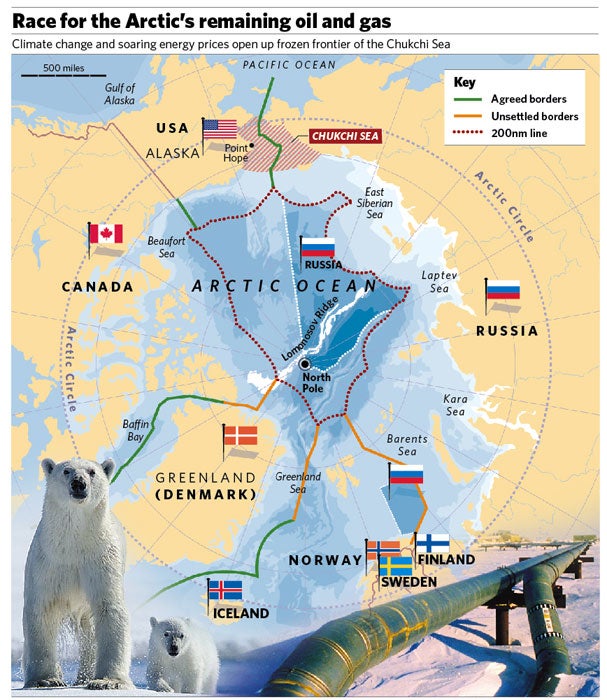US censors Arctic scientists' findings as it prepares for oil and gas auction

The United States has blocked the release of a landmark assessment of oil and gas activity in the Arctic as it prepares to sell off exploration licences for the frozen Chukchi Sea off Alaska, one of the last intact habitats of the polar bear.
Scientists at the release of the censored report in Norway said there was "huge frustration" that the US had derailed a science-based effort to manage the race for the vast energy reserves of the Arctic.
The long-awaited assessment was meant to bring together work by scientists in all eight Arctic nations to give an up-to-date picture of oil and gas exploitation in the high north. In addition to that it was supposed to give policy makers a clear set of recommendations on how to extract safely what are thought to be up to one quarter of the world's energy reserves.
Speaking yesterday from Tromso, one of the report's lead authors, who asked not to be named, said: "They [the US] have blocked it. We have no executive summary and no plain language conclusions."
Earlier this month, the Bush administration drew widespread criticism when it said it would auction off 30 million acres of the remote Chukchi Sea which separates Alaska from Russia on 6 February. The sale to oil and gas companies has been rushed through before Congress can complete efforts to protect the polar bear under the Endangered Species Act, a move which could complicate efforts to sell its habitat to oil majors.
The US House of Representatives held a hearing last week to investigate the timing of the Chukchi sell off.
"Oil and gas is a sensitive subject," said the unnamed author of the Arctic Council report, which has taken six years to compile. "And this could be linked to activities in the Chukchi Sea between the US and Russia where more research and assessment is needed."
A draft of the censored recommendations, seen by The Independent, called on governments to conduct proper research on environmental impacts before signing off new oil and gas projects in ecologically sensitive areas such as the Chukchi.
One of the lead scientists at the Arctic Council, who again asked to remain anonymous, said: "The key message was to be more careful. To check more before you drill for oil and gas in the Arctic."
Comparatively little is known about the polar bear population in the Chukchi because there hasn't been an intensive study since the mid-1990s. The US mineral management service said it would allow companies to "explore this intriguing frontier area" but critics, including Senator John Kerry, have demanded a three-year delay while the impact on polar bears can be examined.
"For a polar bear population already stressed due to massive climate change, these activities could be the last straw," said Kassie Siegel, the climate director at the US-based Centre for Biological Diversity.
She said the censoring of the Arctic report was typical of the actions of the White House. "It fits a pattern of downplaying, denying, and suppressing climate science at every turn. It's all part of the Bush-Cheney strategy of handing out as many fossil fuel entitlements as quickly as they can in their final months in office."
As climate change melts more of the north polar ice cap and global demand for oil and gas surges there has been a frantic scramble for the Arctic's vast energy wealth. The combination of increased access and prices has seen Russia, Norway, Denmark and Canada step up claims to sovereignty over the North Pole, while the US waits in the wings.
The Chukchi Sea is believed to hold 15 billion barrels of recoverable oil and 76 trillion cubic feet of natural gas. The receding sea ice and record price for crude is tempting companies into Arctic oil and gas development further out to sea with potentially disastrous consequences. The agencies approving the Chukchi sale admit there is a 40 per cent chance of an oil spill, and that contact with spilt oil is almost certainly fatal for polar bears.
Join our commenting forum
Join thought-provoking conversations, follow other Independent readers and see their replies
Comments
Bookmark popover
Removed from bookmarks